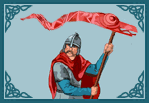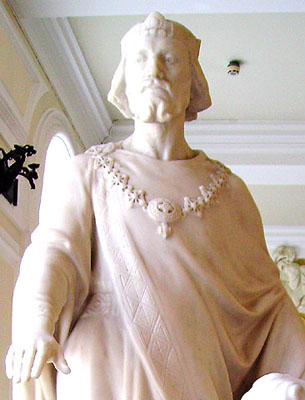 |
 |
|||
|
|
Hywel Dda (the Good) was the son of Cadell, King of Seisyllwg. While still a prince, he seems to have overrun Dyfed and executed its king, Rhodri, in AD 905. He subsequently legitimized his rule there by marrying Elen, the daughter and heiress of Rhodri's elder brother and predecessor, King Llywarch.
When his father died in AD 909, Hywel and his brother, Clydog, succeeded to his dominions. Clydog probably became King of Ceredigion, while Hywel added Ystrad Tywi to Dyfed.
Subject to King Aethelred of Mercia in the early part of his reign, Hywel became the direct subordinate of King Edward the Elder of Wessex on the death of the Aethelflaed's widow in AD 918. Edward had taken possession of Mercia and three kings in Wales, Hywel, Clydog his brother and Idwal his cousin, sought him as their overlord. Clydog's death in AD 920 further strengthened Hywel's position. He inherited his kingdom, uniting Ceredigion & Ystrad Tywi (together called Seisyllwg) with Dyfed to create the kingdom of Deheubarth. By AD 924, Hywel is the only Welsh prince mentioned among the princes ruled over by the English King Aethelstan.
Hywel's chief fame is as a lawgiver, but the vast code of Welsh laws which goes by the name of the 'Laws of Hywel the Good' only survives in manuscripts of comparatively late date. There are two Latin manuscripts, of the 12th and 13th century. The prefaces contain an account of the circumstances under which the laws were drawn up, according to which, Hywel, "seeing that the Welsh were perverting the laws," summoned to him six men from each cymmwd of the Principality to the White House on the Taff (y Ty Gwyn ar Taf, now Hendy-gwyn or Whitland in Carmarthenshire), four laymen and two clerks, the latter to prevent the laymen from "ordaining anything contrary to holy scripture." They met in Lent "because everyone should be pure at that holy time." These wise men carefully examined the old laws, rejected some, amended others and enacted some new ones. Hywel then promulgated the code they drew up and he and his counsellors pronounced a curse of all the Welsh on those who should not obey the laws, and on all judges who undertook judicial duties without knowing the three columns of law and the worth of tame and live animals, or on any lord who conferred office on such a judge. After this Hywel went with the bishops of St. David's, St. Asaph and Bangor, and some others to Rome, where the laws were read before the Pope, who gave them his sanction. "And from that time to the present, the laws of Hywel the Good are in force." The form in which the laws of Hywel Dda now exist does not profess to preserve the shape which he gave them. In a few exceptional cases only is a law described as being the law as Hywel established it. The laws manifestly contain much early custom which may be referred back to Hywel's time or to an earlier date. Hywel the Good has been credited with having anticipated the English House of Commons by more than three hundred years.
One clearly attested fact in Hywel's life is his pilgrimage to Rome in 928. The chroniclers put the death of his wife, Elen, in the same year. After his return, he increased his close relations with the new English king, Aethelstan, in order to help pursue his ambitions at home. He often travelled east to attend the meetings of the English Witan, attesting charters along with the other English magnates while he was there. He subscribed to charters in July 931, Nov 931, Aug 932, Dec 933, May 934, Dec 934 and also in 937. Then, in Edred's reign, in 946 and 949. He usually styled himself 'Howel subregulus', or 'Huwal undercyning', but in the later charters issued after the death of his cousin, Idwal, it is perhaps significant that he becomes 'Howel regulus,' or 'Howel rex.'.
King Idwal of Gwynedd was killed in AD 943, fighting against the forces of King Edmund of England. Hywel, as his cousin, took advantage of the situation, invaded Gwynedd and expelled Idwal's sons. He then became King of Gwynedd and perhaps overlord of Powys, leaving only Morgannwg and Gwent not under Hywel's control.
The traditional judgement on Hywel is that he was "the wisest and justest of all the Welsh princes. He loved peace and justice, and feared God, and governed conscientiously. He was greatly loved by all the Welsh and by many of the wise among the Saxons, and on that account was called Hywel the Good". His death is assigned by a tenth-century chronicle to AD 950. Hywel and his wife had a number of children: Owain, Rhodri, Rhain, Einion and Angharad. Another, Edwyn, was an illegitimate son by Hywel's English mistress, Aethelflaed. Hywel was chiefly succeeded in Deheubarth by his eldest son, Owain, although he appears to have ruled jointly with his brothers, Rhodri and Edwyn, for a while. The other sons presumably predeceased their father. Records of Hywel Dda date back to the 10th century. He is an historic personage
|
|||
| © Nash Ford Publishing 2021. All Rights Reserved. | ||||





